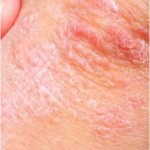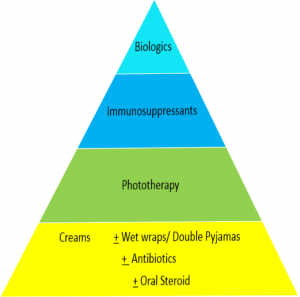Eczema (Dermatitis)
Eczema, also known as dermatitis, is common in children and adults. It can affect anywhere on the skin, from the scalp to the toes.
Eczema is red, dry, flaky, peeling skin that is itchy. If it becomes infected from repeated scratching, the skin can become wet and crusty.

There are 7 types of eczema
1. Atopic eczema
This is a genetic tendency to have dry, itchy, red skin that easily becomes infected. A person or family member with atopic eczema may also have asthma, allergic rhinitis (sinusitis) and allergic conjunctivitis.
2. Dishydrotic eczema/ Pompholyx
This condition has vesicles (fluid-filled bumps) usually over the palms and soles and sides of fingers and toes. It can be intensely itchy. The underlying inflammation causes these fluid- filled bumps but they may worsen with secondary infection.
3. Seborrhoeic eczema
This condition occurs in babies, adolescents and adults. It usually occurs over oily producing areas of the scalp, medial eyebrows, sides of the nose and chest. In babies, it can also occur over the diaper area. It is thought to be associated with a type of yeast overgrowth known as Malassezia furfur.
4. Discoid eczema
This presents as round, coin-shaped rashes that can be dry or oozy occurring usually over the limbs but can also involve the body.
5. Stasis eczema
This condition is associated with underlying stasis and varicose veins due to prolonged standing but can have underlying genetic predisposition. It usually presents first over the lower limbs, such as the ankles but can worsen to involve the body and upper limbs.
6. Asteatotic eczema
This condition is due to dryness that comes with ageing, menopause and other underlying medical conditions or medications such as statins.
7. Contact dermatitis
Irritant contact dermatitis
Often due to frequent contact with water and chemicals that can cause the skin to dry out and become red and itchy, eg. Washing hands many times a day.
Allergic contact dermatitis
This is a true allergy to chemicals and a patch test can help detect the source.
Management
If you are prone to eczema, the following may help relieve your skin and prevent flares:
Avoid hot, humid, dusty environments
Wear loose, cotton clothing.
Avoid frequent contact with chemicals and hot water. They irritate and dry the skin. Mild soaps and soap substitutes are recommended.
Avoid smoking.
Minimize scratching.
In addition, your doctor will prescribe medicated creams, lotions or ointments best suited for you. Moisturisers are a must and are to be used even after the eczema has settled. If necessary, antibiotics, anti-itch tablets or other oral medications will given as indicated.
Eczema is often likely to recur even many months later, so it is best to understand your skin. Know what aggravates it and avoid the flare factors. Be aware of what makes it better and instill it in your daily regime. Know your medications and be vigilant with the treatment plan. Your doctor will help and advise if you are unsure.


 Contact us for
Contact us for
 Contact us for
Contact us for